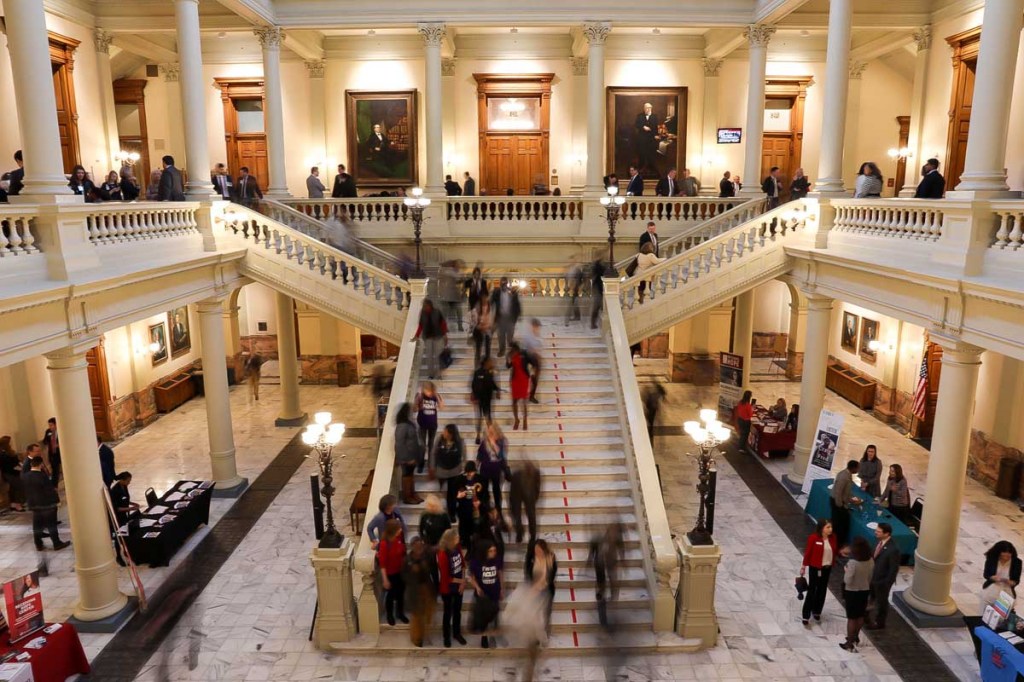Bill filed to legalize online sports betting
Published 2:00 pm Monday, February 24, 2020

- The Capitol Building bustles with lawmakers and lobbyists on the first day of the 2020 legislative session in Atlanta on Jan. 13.
ATLANTA — Lawmakers have taken the first step toward legalizing online sports betting in Georgia.
Sen. Burt Jones, R-Jackson, filed a bill last week that would allow the Georgia Lottery to oversee an online sports betting system with profits going toward the state’s HOPE scholarship.
“The Georgia lottery is already in place and gambling in that form is legal right now,” Jones said on Monday. “There’s a big talk about us not having enough funds moving forward with a lottery system. I think (online sports betting) is an easy way to generate more dollars.”
Out of session, both House and Senate members heard arguments for and against legalization of gambling in various forms — horse racing, sports betting and casinos.
Lawmakers and industry experts argue that delaying a decision has the state losing out on dollars. Sports betting advocates argue that the industry is already taking place in Georgia, behind the scenes without the state benefiting from it.
Estimates of exactly how much extra revenue sports betting will bring to the state are all over the board. Sports team CEOs estimated $50 million in gross revenue while Jones said a conservative estimate would be anywhere form $20 to $40 billion.
Regardless, it could bring in “significant dollars,” he said.
“It is here, why not try to regulate it like we do other industries that cause vices or cause people to do things that we don’t think they should be doing morally” he said. “The people who are against that for those reasons they’re going to be against it regardless of what we say or do.”
But the chances for legalization of sports betting and other forms of gambling in Georgia are up in the air. The Senate Majority Caucus as well as the Lt. Gov. said gambling was not on their priority list.
“I’ve not had a line of senators over the last nine months outside that office trying to take the door off the hinges to talk about gambling…” Geoff Duncan told reporters last month. “I just haven’t seen that overwhelming push for gambling here in the state of Georgia — I certainly haven’t heard it out as I’ve traveled around the state.”
Across the hall, House Speaker David Ralston has heard the opposite — that there seems to be a growing appetite for legalization this session.
The legalization of sports betting has seen a push like never before from sports teams.
Presidents of the Atlanta Hawks, the Atlanta Braves, the Atlanta Falcons and Atlanta United teams formed an alliance and sent a letter of support to state lawmakers advocating for legalization.
“Georgia is the 12th largest state for illegal wagering,” the letter states. “It is not going away. That is why we must ensure the industry is above-board and transparent.”
Legalizing gambling would require a constitutional amendment on the ballot for voters to decide. Jones’ bill dodges that requirement by putting sports betting under the lottery system.
“I would rather the voters vote on this,” Jones said. “I’d rather the voters vote on all aspects of gambling but in order to do that, you got to have a two thirds majority in the House and Senate. But I’ve always been one of those let’s put it to the voters, let them decide on every piece of of the gambling spectrum.”
The bill would require participants to be over 21 and be inside Georgia borders to wager.
Sports betting companies would pay a 20% tax. The money would go — as it traditionally has from the lottery — to the HOPE Scholarship, with a small carve out to be put toward other funds.
It would also limit the number of sports betting companies able to be licensed in Georgia to eight.
Jones said he hopes to have a hearing in the upcoming week, since legislations must be out of committee next Friday to meet the crossover day deadline.
Under harsh budget conditions, lawmakers are acting quick to pass bills that would result in additional state revenue.
The first bill passed this session would mandate “marketplace facilitators” who sell goods or services via the internet to collect and remit sales taxes. The bill goes into effect April 1.





